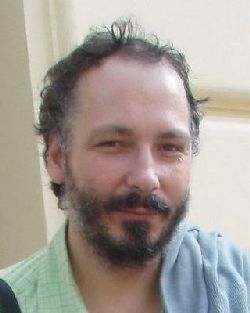doc. Mgr. Radovan Šikl, Ph.D.
Institute of Psychology
The Czech Academy of Sciences
Veveří 97
602 00 Brno
Phone: +420 532 290 129
E-mail: sikl@psu.cas.cz
Research interests
- Visual perception
- Cognitive psychology
- History of psychology
Education and academic qualifications
- 2015: Habilitation in General Psychology, Faculty of Arts, Masaryk University
- 1996 - 2001: Ph.D. Studies in General Psychology, Faculty of Arts, Masaryk University
- 1989 - 1994: Master’s Studies in Psychology, Faculty of Arts, Masaryk University
Academic employment
- 1996 - present: Institute of Psychology, Czech Academy of Sciences, research fellow
Grant projects
- 2022 - 2025: Grant Agency of the Ministry of Health grant "Telerehabilitation of visually impaired seniors with macular degeneration - a comparative study of quality of life and visual functions after macular lens implantation or monocular dioptric hypercorrection". Grant no. NU22-06-00039. Research team member.
- 2020 - 2022: Czech Science Foundation grant "Maximal visual memory". Grant no. 20-06894S. Research team member.
- 2019 - 2021: Czech Science Foundation grant "Creators of contemporary Czech psychology: contribution to oral history of Czech psychology". Grant no. 19-11117S. Research team member.
- 2018 - 2022: Grant Agency of the Ministry of Health grant "Improving the quality of life in patients with stable maculopathy by implanting intraocular macula lenses and modulating visual plasticity by transcranial electrical stimulation" Project no. NV18-06-00484. Research team member.
- 2016 - 2018: Grant Agency of Masaryk University grant "Influence of cartographic visualization on solving practical and instructional space tasks." Grant no. MUNI/M/0846/2015. Research team member.
- 2013 - 2015: Czech Science Foundation grant "Spatial Perception of Photographic Scenes." Grant no. 13-28709S. Co-principal investigator.
- 2012 - 2013: Czech Science Foundation grant "Longitudinal study of visual perception of sight-recovery patients after a long-term sensory deprivation." Grant no. P407/12/2528. Principal investigator.
- 2009 - 2012: Czech Science Foundation grant "Perception and memory changes during long-term isolation." Grant no. 406/09/2003. Principal investigator.
- 2007 - 2009: Czech Science Foundation grant "Selected aspects of the relationship between physical and visual space." Grant no. 406/07/167. Principal investigator.
- 2003 - 2005: Czech Science Foundation grant "Visual perception of near space." Grant no. 406/03/D224. Principal investigator.
- 2000 - 2001: Czech Science Foundation grant "Perceiving the structure of moving objects." Grant no. 406/00/0846. Principal investigator.
Research and professional activities
- 2023: The Archive of Czechoslovak Psychology
- 2022 - present: Member of the Scientific board of the Faculty of Arts at University of Ostrava
- 2018 - 2022: Member of the Scientific board of the Faculty of Social Sciences at Masaryk University
- 2017 - present: Deputy director at the Institute of Psychology, Czech Academy of Sciences
- 2016 - 2019: exhibition Klamárium (Brno, Praha, Ostrava, Košice)
- 2015 - 2019: Member, since 2017 chairman of the evaluation panel Psychology, pedagogy of the Czech Science Foundation
- 2012 - 2022: Member of the Board of the Institute of Psychology
- 2009 - 2023: Co-organizer of the Winter school of cognitive psychology
- 2006, 2011: Organizer of the conference Kognice
- 2003 - 2023: Head of the Department of cognitive psychology at the Institute of Psychology, Czech Academy of Sciences
Teaching
- 2017 - 2020: University of ss. Cyril and Methodus in Trnava. Classes: Cognitive psychology, Visual perception, Seminar in general psychology
- 1999 - 2015: Masaryk University in Brno. Classes: Visual perception, Discussion on current topics of cognitive psychology
Selected publications
- Šikl, R., Brucknerová, K., Švedová, H., Děchtěrenko, F., Ugwitz, P., Chmelík, J., Pokorná, H., Juřík, V. (2024): Who benefits and who doesn't in virtual reality learning: An experimental study comparing two types of school. Journal of Computer Assisted Learning, 40(4), 1591-1604.
- Šikl, R., Preiss, M., Hoskovcová, S. (2024): Between conformity and individuality: Psychologists in Czechoslovakia during normalization (1968–1989). History of Psychology, 27(2), 178-198.
- Nekolová, J., Kremláček, J., Lukavský, J., Šikl, R., Sin, M., Langrová, J., Szanyi, J., Jirásková, N. (2023): The intraocular implant and visual rehabilitation improve the quality of life of elderly patients with geographic atrophy secondary to age-related macular degeneration. Graefes Archive for Clinical and Experimental Ophthalmology, 261(1), 263-272.
- Šikl, R., Vobořil, D. (2023): Archiv československé psychologie. Československá psychologie, 67(2), 161-165.
- Čermák, I., Šikl, R., Chrz, V., Švaříčková Slabáková, R., Filip, M., Vobořil, D., Hoskovcová, S., Černá, M. (2022): Příběh československé psychologie: rozhovory s osobnostmi oboru II. Praha: Portál. ISBN 978-80-262-1944-6.
- Čermák, I., Šikl, R., Vobořil, D., Chrz, V., Filip, M., Černá, M., Hoskovcová, S., Heller, D. (2021): Příběh československé psychologie: rozhovory s osobnostmi oboru I. Praha: Portál. ISBN 978-80-262-1659-9.
- Hoskovcová, S., Černá, M., Šikl, R. (2020): Dějiny katedry psychologie Filozofické fakulty Univerzity Karlovy v Praze. Československá psychologie, 64(Supplement I), 62-73.
- Šikl, R., Vobořil, D. (2020): Dějiny československé psychologie v údajích a číslech. Československá psychologie, 64(Supplement I), 3-42.
- Šikl, R., Vobořil, D. (2020): Dějiny vysokoškolské výuky a studia psychologie v Československu v údajích a číslech. Československá psychologie, 64(Supplement I), 43-61.


